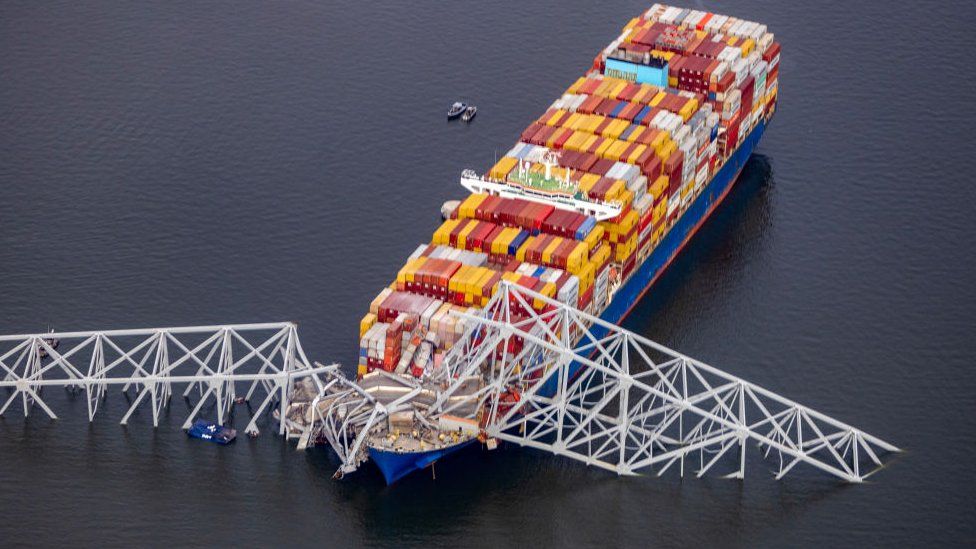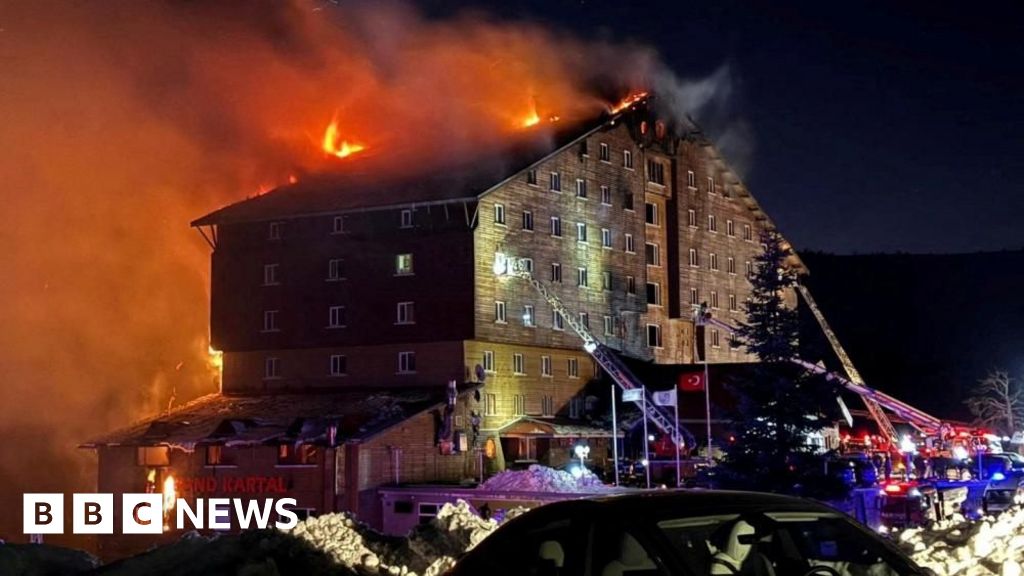ARTICLE AD BOX
 Image source, Tasos Katopodis
Image source, Tasos Katopodis
In an aerial view, cargo ship Dali is seen after running into and collapsing the Francis Scott Key Bridge near Baltimore
When a massive cargo ship sent Baltimore's Francis Scott Key Bridge crumbling into the water, it created both a human and economic disaster.
On Wednesday, officials said they had recovered two bodies from a pickup truck that was on the bridge when it collapsed and alerted their grieving families. Four others remain missing and are presumed dead.
But the bridge's collapse has also cut off a main artery that billions of dollars of goods has flowed through to a key American port. Now boat traffic is at a standstill and the wreckage of the bridge still lays across the Patapsco River. Officials warn that the closure could create a massive ripple effects in the global supply chain.
In 2023, 52.3 million tons of foreign cargo, worth $80.8 billion (£64 billion), passed through the port of Baltimore, according to data from the state of Maryland.
"This is an important port for both imports and exports," Transportation Secretary Pete Buttigieg said at a White House briefing. "And it's America's largest vehicle handling port, which is important not only for car imports and exports, but also for farm equipment."
About a dozen ships are currently trapped in the port, Vice Admiral Peter Gautier told reporters, adding that the foreign-flagged vessels are "dry bulk carriers, car carriers and a number of maritime administration ships".
Under ordinary circumstances, an enormous variety of goods like automobiles, soybeans, pharmaceuticals, metals, textiles, animal feed, and even newsprint pass in and out of the port. It's also critical for maritime travel; 444,000 passengers cruised through Baltimore in 2023, according to state data.
Here's what we know about what flows through Baltimore's port:
The amount of cargo handled by the port has grown steadily since 1998.
Automobiles are the facility's signature product. Nearly 850,000 cars and light trucks flowed through the Port of Baltimore in 2023, according to Maryland state data, more than any other US port.
A majority of those cars come from foreign manufacturers like Mazda, Subaru, and Mercedes-Benz, meaning the closure could have major implications for the companies across the globe. Car manufacturers have already started to divert their products in the wake of the bridge collapse.
Jeremie Papin, Chair of Nissan Americas, told the BBC, "We have been re-routing our ships to other ports in the east coast and, so, we think there will be minimal, if any, impact to our business in the near term."
Fossil fuels, particularly coal are some of the biggest exports that go through the Port of Baltimore. Coal made up a lion's share of these shipments, with over 13.2 tonnes exported in 2022, according the US Bureau of Transportation Statistics. Shipments of fuel oils, natural gas, and other fossil fuel products were also imported and exported.
Plenty of goods used in everyday life were brought into the US through Baltimore in 2022, according to data from the US Bureau of Transportation Statistics.
Over 106,000 tonnes of furniture, 738,000 tonnes of newsprint, 36,000 tonnes of alcoholic beverages, and 83,000 tonnes of meat and seafood entered the port that year. Imports of plastics and rubber totalled more than 221,000 tonnes in 2022.
"Our top priority is to get the shipping lane open because of the impact it has on our country and the global supply chain," US Senator Ben Cardin of Maryland said at a press conference on Wednesday. "We are also working on a replacement bridge, so we can have those plans in place to reconstruct the bridge as quickly as possible."
But the economic toll of the bridge collapse goes beyond just the items that pass in and out.
The port of Baltimore generates about 15,000 jobs, according to the Maryland governor's office, and nearly 140,000 jobs total are linked to the port's activities. About 8,000 jobs have been directly affected by the closure.
"The collapse of the Key Bridge is not just a Maryland crisis, the collapse of the Key Bridge is a global crisis," Maryland Governor Wes Moore said on Wednesday. "The national economy and the world's economy depends on the Port of Baltimore."

 9 months ago
1763
9 months ago
1763








 English (US) ·
English (US) ·